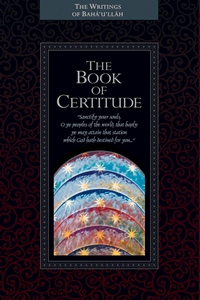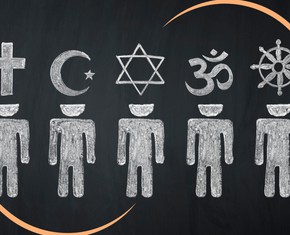The views expressed in our content reflect individual perspectives and do not represent the authoritative views of the Baha'i Faith.
“Foremost among the priceless treasures cast forth from the billowing ocean of Bahá’u’lláh’s Revelation ranks the Kitáb-i-Íqán,” wrote Shoghi Effendi, the Guardian of the Baha’i Faith.
When I first read The Kitab-i-Iqan, which translates to The Book of Certitude, I couldn’t put it down. I was mesmerized by verses that enlightened my mind and kindled my heart. Read to learn more about the power and significance of this holy book.
What is The Kitab-i-Iqan: The Book of Certitude?

Baha’u’llah, the prophet and founder of the Baha’i Faith, revealed The Book of Certitude in 1861/62 in the span of two days and two nights. He wrote this treatise in response to questions asked by one of the maternal uncles of the Bab — the herald and forerunner of Baha’u’llah. The Kitab-i-Iqan fulfills “the prophecy of the Báb, Who had specifically stated that the Promised One would complete the text of the unfinished Persian Bayán” — a volume that the Bab wrote around 1847 before he was martyred in 1850.
Shoghi Effendi translated The Book of Certitude, incorporating suggestions from Dr. Alain Locke — an African American Baha’i who was the first Black Rhodes Scholar and heralded as the “Father of the Harlem Renaissance,” before it was first published in English in 1931.
Shoghi Effendi stated that this book “occupies a position unequalled by any work in the entire range of Bahá’í literature, except the Kitáb-i-Aqdas, Bahá’u’lláh’s Most Holy Book. Revealed on the eve of the declaration of His Mission, it proffered to mankind the ‘Choice Sealed Wine,’ whose seal is of ‘musk,’ and broke the ‘seals’ of the ‘Book’ referred to by Daniel, and disclosed the meaning of the ‘words’ destined to remain ‘closed up’ till the ‘time of the end.’”
A Summary of The Kitab-i-Iqan: The Book of Certitude
Shoghi Effendi summarized The Book of Certitude in the following words:
Within a compass of two hundred pages it proclaims unequivocally the existence and oneness of a personal God, unknowable, inaccessible, the source of all Revelation, eternal, omniscient, omnipresent and almighty; asserts the relativity of religious truth and the continuity of Divine Revelation; affirms the unity of the Prophets, the universality of their Message, the identity of their fundamental teachings, the sanctity of their scriptures, and the twofold character of their stations; denounces the blindness and perversity of the divines and doctors of every age; cites and elucidates the allegorical passages of the New Testament, the abstruse verses of the Qur’án,
…enumerates the essential prerequisites for the attainment by every true seeker of the object of his quest; demonstrates the validity, the sublimity and significance of the Báb’s Revelation; acclaims the heroism and detachment of His disciples; foreshadows, and prophesies the world-wide triumph of the Revelation promised to the people of the Bayán; upholds the purity and innocence of the Virgin Mary; glorifies the Imáms of the Faith of Muḥammad; celebrates the martyrdom, and lauds the spiritual sovereignty, of the Imám Ḥusayn; unfolds the meaning of such symbolic terms as ‘Return,’ ‘Resurrection,’ ‘Seal of the Prophets’ and ‘Day of Judgment’; adumbrates and distinguishes between the three stages of Divine Revelation; and expatiates, in glowing terms, upon the glories and wonders of the ‘City of God,’ renewed, at fixed intervals, by the dispensation of Providence, for the guidance, the benefit and salvation of all mankind.
My Favorite Highlights and Quotes From The Book of Certitude
As you can see, The Book of Certitude answers numerous questions pertaining to God’s timeless and unfolding revelation. If you’ve ever wondered why there are so many religions and how Judaism, Christianity, Islam, and the Baha’i Faith connect to each other, I encourage you to read this book.
While reading The Book of Certitude, I also gained a deeper understanding of the power of the word of God and the scores of meanings that these verses convey, what knowledge is and how we obtain it, the qualities we need to comprehend the holy writings, the significance of an understanding heart, and the dangers of forgetting God.
For example, in The Book of Certitude, Baha’u’llah quoted the following verses from the Qur’an”:
‘And whoso shall withdraw from the remembrance of the Merciful, We will chain a Satan unto him, and he shall be his fast companion. …And whoso turneth away from My remembrance, truly his shall be a life of misery.’
The Creator of the universe knows us better than we know ourselves. When we forget God, we forget our higher nature and lose track of what is important in life. This book can unveil a treasury of divine wisdom before your eyes if you have an open mind and heart. Baha’u’llah begins The Book of Certitude with the following words:
THE essence of these words is this: they that tread the path of faith, they that thirst for the wine of certitude, must cleanse themselves of all that is earthly—their ears from idle talk, their minds from vain imaginings, their hearts from worldly affections, their eyes from that which perisheth. They should put their trust in God, and, holding fast unto Him, follow in His way.
















Comments
Sign in or create an account
Continue with Googleor